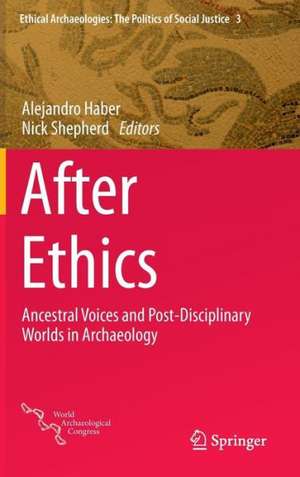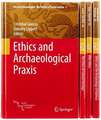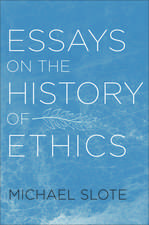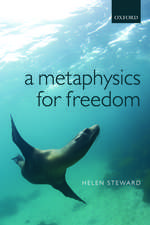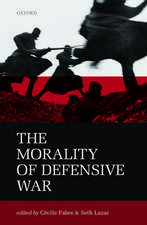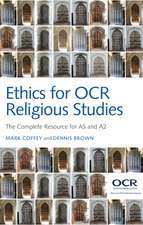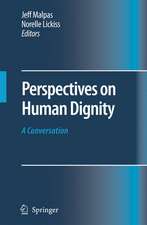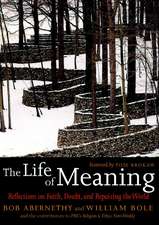After Ethics: Ancestral Voices and Post-Disciplinary Worlds in Archaeology: Ethical Archaeologies: The Politics of Social Justice, cartea 3
Editat de Alejandro Haber, Nick Shepherden Limba Engleză Hardback – 6 noi 2014
| Toate formatele și edițiile | Preț | Express |
|---|---|---|
| Paperback (1) | 577.10 lei 38-44 zile | |
| Springer – 12 mar 2016 | 577.10 lei 38-44 zile | |
| Hardback (1) | 696.35 lei 6-8 săpt. | |
| Springer – 6 noi 2014 | 696.35 lei 6-8 săpt. |
Preț: 696.35 lei
Preț vechi: 819.23 lei
-15% Nou
Puncte Express: 1045
Preț estimativ în valută:
133.29€ • 144.83$ • 112.03£
133.29€ • 144.83$ • 112.03£
Carte tipărită la comandă
Livrare economică 21 aprilie-05 mai
Preluare comenzi: 021 569.72.76
Specificații
ISBN-13: 9781493916887
ISBN-10: 1493916882
Pagini: 100
Ilustrații: XVII, 140 p. 11 illus., 5 illus. in color.
Dimensiuni: 155 x 235 x 13 mm
Greutate: 0.4 kg
Ediția:2015
Editura: Springer
Colecția Springer
Seria Ethical Archaeologies: The Politics of Social Justice
Locul publicării:New York, NY, United States
ISBN-10: 1493916882
Pagini: 100
Ilustrații: XVII, 140 p. 11 illus., 5 illus. in color.
Dimensiuni: 155 x 235 x 13 mm
Greutate: 0.4 kg
Ediția:2015
Editura: Springer
Colecția Springer
Seria Ethical Archaeologies: The Politics of Social Justice
Locul publicării:New York, NY, United States
Public țintă
ResearchCuprins
Chapter 1: After ethics. Ancestral voices and post-disciplinary worlds in archaeology: an introduction.- Chapter 2: Undisciplining archaeological ethics .- Chapter 3: “Do as I say and not as I do.” On the gap between good ethics and reality in African archaeology.- Chapter 4: Archaeology and development: ethics of an inevitable relationship.- Chapter 5: The mark of the Indian still inhabits our body. On ethics and disciplining in South American archaeology.- Chapter 6: Excess of hospitality. Critical semiopraxis and theoretical risks in postcolonial justice.- Chapter 7: On burial grounds and city spaces —reconfiguring the normative.- Chapter 8: Archaeology after archaeology.
Notă biografică
Nick Shepherd is Associate Professor of African Studies and Archaeology at the University of Cape Town and Head of the African Studies Unit. He was founding editor of the journal Archaeologies: Journal of the World Archaeological Congress. In 2004-5 he was based at Harvard University as a Mandela Fellow. In 2008 he was a Visiting Professor at Brown University, and in 2009 at the University of Basel. He has published widely on questions of archaeology and society in Africa and on questions of public history and heritage. His books include the volume Desire lines; space, memory and identity in the post-apartheid city (Routledge 2007, with Martin Hall and Noeleen Murray) and New South African keywords (Jacana Media-Ohio University Press, 2008, with Steven Robins).
Alejandro Haber is Titular Professor at the Universidad Nacional de Catamarca and Independent Researcher at the Consejo Nacional de Investigaciones Científicas y Técnicas, San Fernando del Valle de Catamarca, Argentina. He has been researching the theoretical and methodological assumptions of the archaeological discipline from different approaches, including sociology, history and philosophy of archaeology. He is regionally specialized in the South Central Andes, and has conducted research in the same area for decades. He is particularly interested in challenging Western assumptions as codified within the archaeological discipline while developing wider conversations with local and Quechua-Aymara epistemes, within the poscolonial context of frontier expansion. His recent work develops a no-methodology as un-disciplined archaeology. He is co-editor of the Arqueología Suramericana – Arqueología Sul-Americana, published in Spanish and Portuguese. His recent books include Hacia una arqueología de las arqueologías sudamericanas (Uniandes, Bogotá, Colombia, 2004), Domesticidad e interacción en los Andes meridionales (Unicauca, Popayán, Colombia, 2008) and La casa, las cosas y los dioses (Encuentro/Humanidades, Córdoba/Catamarca, Argentina, 2012). Recent publications in the English language include papers on intercultural archaeology (World Archaeology 39:2, 2007), on animism and post-Western perspectives (Cambridge Archaeological Journal 19:3, 2009), on WAC and globalized science (with Nick Shepherd, Public Archaeology 10:2, 2011) and on Un-disciplining Archaeology (Archaeologies 8:1, 2012).
Alejandro Haber is Titular Professor at the Universidad Nacional de Catamarca and Independent Researcher at the Consejo Nacional de Investigaciones Científicas y Técnicas, San Fernando del Valle de Catamarca, Argentina. He has been researching the theoretical and methodological assumptions of the archaeological discipline from different approaches, including sociology, history and philosophy of archaeology. He is regionally specialized in the South Central Andes, and has conducted research in the same area for decades. He is particularly interested in challenging Western assumptions as codified within the archaeological discipline while developing wider conversations with local and Quechua-Aymara epistemes, within the poscolonial context of frontier expansion. His recent work develops a no-methodology as un-disciplined archaeology. He is co-editor of the Arqueología Suramericana – Arqueología Sul-Americana, published in Spanish and Portuguese. His recent books include Hacia una arqueología de las arqueologías sudamericanas (Uniandes, Bogotá, Colombia, 2004), Domesticidad e interacción en los Andes meridionales (Unicauca, Popayán, Colombia, 2008) and La casa, las cosas y los dioses (Encuentro/Humanidades, Córdoba/Catamarca, Argentina, 2012). Recent publications in the English language include papers on intercultural archaeology (World Archaeology 39:2, 2007), on animism and post-Western perspectives (Cambridge Archaeological Journal 19:3, 2009), on WAC and globalized science (with Nick Shepherd, Public Archaeology 10:2, 2011) and on Un-disciplining Archaeology (Archaeologies 8:1, 2012).
Textul de pe ultima copertă
While books on archaeological and anthropological ethics have proliferated in recent years, few attempt to move beyond a conventional discourse on ethics to consider how a discussion of the social and political implications of archaeological practice might be conceptualized differently. The conceptual ideas about ethics posited in this volume make it of interest to readers outside of the discipline; in fact, to anyone interested in contemporary debates around the possibilities and limitations of a discourse on ethics. The authors in this volume set out to do three things. The first is to track the historical development of a discussion around ethics, in tandem with the development and “disciplining” of archaeology. The second is to examine the meanings, consequences and efficacies of a discourse on ethics in contemporary worlds of practice in archaeology. The third is to push beyond the language of ethics to consider other ways of framing a set of concerns around rights, accountabilities and meanings in relation to practitioners, descendent and affected communities, sites, material cultures, the ancestors and so on.
Caracteristici
Put together by the only international archaeological association: the World Archaeological Congress Appeals to archaeologists and heritage managers, as well as anyone interested in contemporary debates around the possibilities and limitations of a discourse on ethics Discusses specifically the ethics of Cultural Resource Management, one of the top-growing fields in 21st century archaeology
